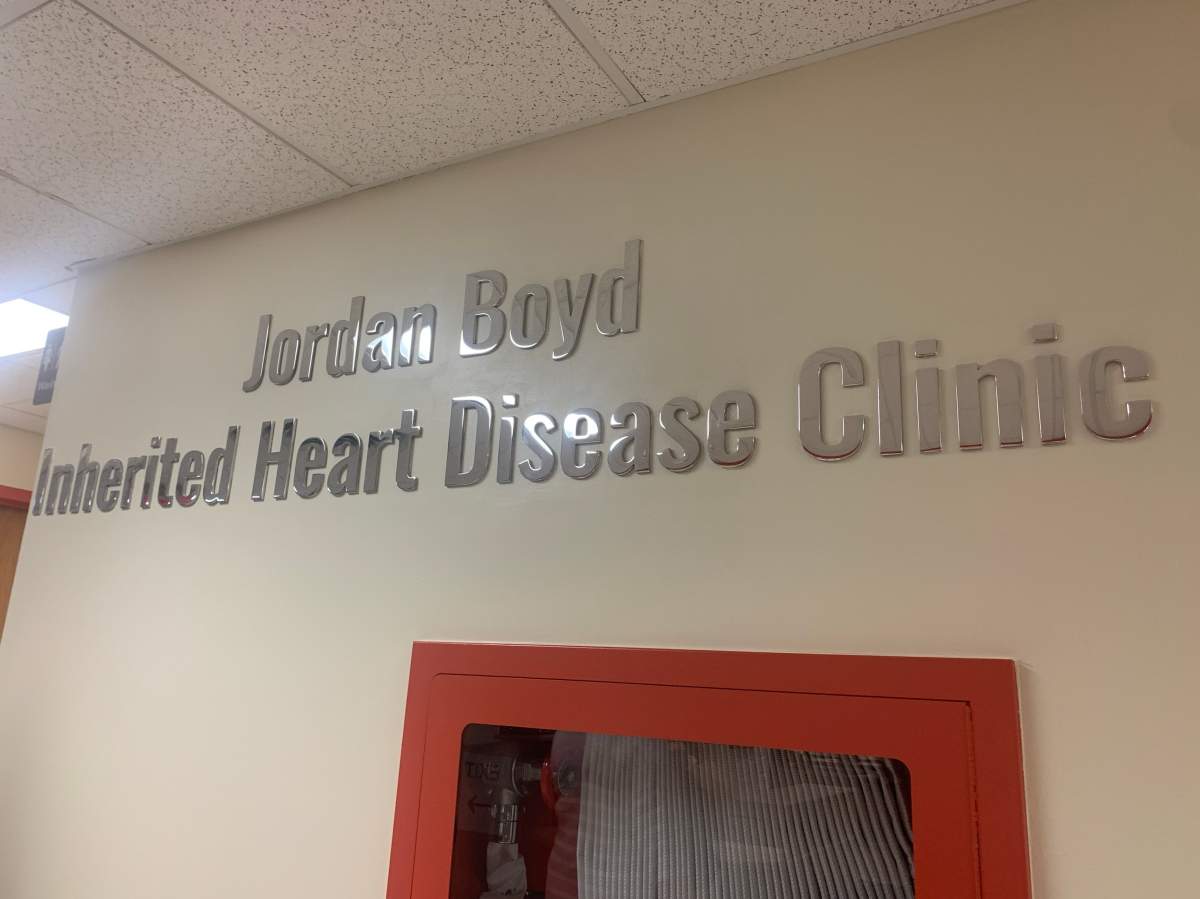A ribbon-cutting ceremony was held at Halifax’s QEII Health Sciences Centre on Thursday, as a heart disease clinic was renamed in honour of a 16-year-old hockey player who died as a result of an undiagnosed inherited heart condition in 2013.

Jordan Boyd, of Bedford, N.S., lost his life to an undetected disease known as Arrhythmogenic Right Ventricular Cardiomyopathy after collapsing on the ice during a training camp with the Acadie-Bathurst Titan of the Quebec Maritimes Junior Hockey League on Aug. 12, 2013.
According to a QEII release, the clinic’s renaming — now dubbed the Jordan Boyd Inherited Heart Disease Clinic — comes as a recognition of Boyd’s legacy and his family’s fundraising efforts to help prevent sudden death from other cardiac arrest instances.
The family, in partnership with the QEII Foundation, raised $1.2 million in funding for “pivotal” research into inherited heart disease done at the clinic that is now named after Jordan Boyd, the research organization said in a statement.
“It’s a full circle moment for the Boyd family, whose journey began with a profound loss but evolved into a powerful movement and rallying point for change.”
The release notes that Boyd’s family has organized several community events including the Jordan Boyd Celebrity Hockey Challenge and Jordan Boyd Celebrity Golf Challenge to fund life-saving research for future families along with “countless initiatives” to raise awareness of and access to automated external defibrillators (AEDs).

Get weekly health news
AEDs are portable electronic devices used to assist someone experiencing a sudden cardiac arrest.
Greg Dobson, Jordan’s brother, attended the ceremony. He said seeing the sign unveiled on Thursday was the culmination of his family’s advocacy efforts following his brother’s death.
“It’s the realization of a dream we had of keeping Jordan’s memory alive in a way that’s meaningful and having a legacy that’ll hopefully help others,” he said.
As a result of a screening that was provided to the family by the QEII clinic following his brother’s sudden passing, Dobson said he was made aware of an unrelated health condition that required two surgeries to resolve.
“The team continues to monitor myself, my mother, my family. I have two young daughters who have gone through genetic testing and thankfully have tested negatively for the gene. So, we know that ends with me,” he said of the clinic’s benefits.
He said the clinic’s renaming fell on a sentimental date for him and his family.
“Today being Jordan’s 27th birthday, I’ve spent a lot of time reflecting today and thinking about what his memory means to me,” he said Thursday. “The fact there’s something here today shows that he’ll always be a part of the conversation.”
The clinic’s impact on families
Mike Janczyszyn, a coordinator for an Emergency Health Services AED registry program, said the Boyd family’s impact on heart-safe communities across Nova Scotia can’t be understated.
“The goal here is really to change that culture and get AEDs from locked cabinets or inside offices to more public locations,” he said, adding that the family has assisted in placing defibrillators in public places.
“And that’s exactly what they’ve done.”
Janczyszyn said the provincial program has increased the number of public AEDs to almost 2,200 — a substantial increase from just 240 about seven years ago.
Dr. Martin Gardner, a cardiologist and the clinic’s founder, has worked alongside Boyd’s family throughout the past decade to raise awareness on how to identify inherited heart diseases ahead of time. During the announcement on Thursday, Gardner described the family’s impact as “beyond measure.”
“They’ve provided funding to the clinic, which has enabled us to hire a research nurse full-time,” he said of the family’s fundraising efforts.
As a result of increased financial support, Gardner said health care providers have since developed a clearer understanding of how rare heart conditions develop genetically which has led to more assessments for families in the Maritimes.
“We’ve learned how to use genetic testing … so we can test other family members to see if they carry the gene. We’ve learned what factors put people at risk if they have one of these disorders, and then we can act and take care of things that way,” he said.
Gardner said following Boyd’s passing, the clinic made efforts to identify if the previously undetected gene was present in other family members.
“The family was referred to us and through that, we found out that, in fact, other family members have it. We actually found the gene abnormality in the family, so we were able to test lots of people,” he explained.
“The fact that we have a clinic (allows us) to do those things the right way.”

— with files from Megan King









Comments